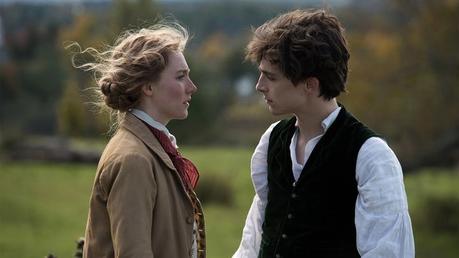For all the perpetual sensibilities, Louisa May Alcott’s 1868 novel, Little Women, is undoubtedly a timeless story; oftentimes, it feels ahead of its time, even when it sets strictly during the American Civil War period. The story of Marches girls tackling the views of freedom and love admirably resonates with the struggles of female emancipation in each era that follows. Therefore, a new iteration of the story seemingly arrives from time to time with specific messages injected in, including the 2019 adaptations by Lady Bird‘s director, Greta Gerwig, which features the most stunning young casts in the recent history with Saoirse Ronan, Emma Watson, Florence Pugh (Midsommar), Eliza Scanlen (HBO’s Sharp Objects), Timothée Chalamet, and Laura Dern.
In the not so distant past, Gilliam Armstrong’s 1994 adaptation (starring Winona Ryder, Kirsten Dunst, and Christian Bale) reflects the story with the rise of feminism’s third wave, which focuses on women’s unity. Gerwig’s version resonates with the roles of women in the wake of woke culture, with depictions of constant battles for social justice and against gender stereotypes. We have seen this feisty spirit of Gerwig’s characters before, but now, she’s projected this feistiness to May Alcott’s characters, whom she puts in a relentless pursuit for answers to their existences within 19th-century norms and values.

Gerwig confidently and cleverly restructures the story into two interweaving timelines. The present, highlighting the lives of the grown-up Marches women, is presented with a cooler palette as if it’s winter at all times; meanwhile, the past, scattering moments from the little women’s childhood to the teenagehood, is presented in a warmer tone, resembling the sparkling rebel spirit. The narratively is mostly observed from the perspective of the grown-up Jo (Ronan), a struggling writer collecting fortune in New York to support her family in Massachusetts. Her older sister, Meg (Watson), struggles with her marriage while assisting her mother (Dern) to tend younger sister, Beth (Scanlen); meanwhile, another sister, Amy (Pugh), is with Aunt March (Meryl Streep) to polish her artistic virtue when she encounters the sisters’ childhood friend, Laurie (Chalamet).
By any means, May Alcott’s story is excessively progressive while never hits the seriousness of similar authors like Jane Austen. Little Women is relentless, playful, and, at the same time, eye-opening. The sisters are given the expositions unraveling their craving for lives more than just being a wife to a man (the whole sentiment makes the wedding decree to “pronounce you man and wife” completely irrelevant to the lives of the Marches). Jo is an aspiring writer; Meg is keen on acting and, implicitly, pageantry; Beth is a piano prodigy, and Amy paints her canvas like a real portrait. The girls have their own ambition, dreams, and craving for liberty which they share through warm (albeit sometimes stone-cold) interactions. Streep’s Aunt March keeps reminding the girls that the only way out of the misery is to marry rich men; but, through Jo’s persistence or Amy’s boldness or Meg’s faithful love, we’ve seen how the girls are eager to earn it subversively even if sometimes the whole thing doesn’t work out. There’s no judgment here and there; we only see women support each other and that’s delightful to see.
To provide an outside perspective, Little Women utilizes Chalamet’s Laurie whose existence breaks the strict gender judgment. While romance clouded his relationship with the girl, Laurie is never a distraction. He’s an observer and the observed at the same time. It would be foolish if someone somehow labels this as a woman-targeted movie. It’s an observation of gender revolving around female characters, but it’s not strictly are for certain gender only.
With Gerwig’s savant dialogues and fast-paced narrative, this version of Little Women makes a radical distinction to any other incarnations without having to strip down the message. The volatile energy brings joy to the beholders, especially in conjunction with the top-notch acting. Ronan channels similar energy as she emanates in Lady Bird; but, it’s Pugh whose charisma rediscovers Amy with more depth to the character. Funny thing is, Gerwig, opts to use the same actors to play in both timelines. While this might confuse audiences a little bit, in the beginning, everything begins to make sense once the tempo harmonizes. The back-and-forth narrative gives the contemplative mood to the story, which only makes it more sentimental and funny at the same time.
Gerwig doesn’t shy away from making this surprisingly hilarious at times (Jo cries over her hair is a golden moment), but, she never makes it overly flamboyant even when she perfectly recreates the period settings exquisitely (special nod to Alexandre Desplat for the grand yet moody scoring). May Alcott’s story transcends the time once again, thanks to Gerwig’s clever writing and direction; but, most importantly, this Little Women ends up being as it is intended to be: intimate and modest.

